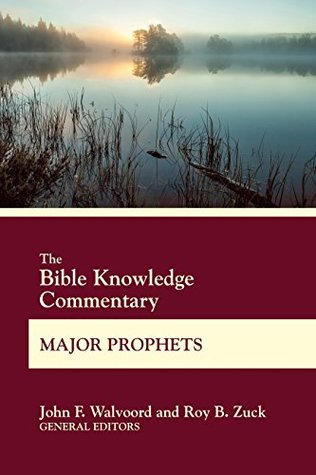- Bible
- Read the Bible
- Bible Versions
- Verse of the Day
- Reading Plans
- Verses by Topic
- Books of the Bible
- Bible Images
- Study
- Commentaries
- Concordances
- Dictionaries
- Encyclopedias
- Sermons
- Bible Atlas & Maps
- BP Wiki
- Devotionals
- Today's Devotionals
- Light of the World
- All Devotionals
- Inspirational Quotes
- More
- Picture Quotes
- Videos
- Inspirational
- Bible Study
- What The Bible Says
- Bible Q&As
- Daily Bread
- Bible by Genre
- Bible Stories
- Random Bible Verse
- Community
- Store
BK Commentary Major Prophets
by John F. Walvoord
Hard Truths and Amazing Grace
Isaiah, Jeremiah, Ezekiel, and Daniel spoke words of warning, comfort, and punishment to the people of Israel in Judah and during the Babylonian Captivity. Though they faced incredible loss and persecution as they grieved the choices the Israelites made, these major prophets of the Old Testament fulfilled their role as God’s voice to a rebellious people.
In this highly respected commentary, Dallas Theological Seminary scholars explore the historical and cultural background of the prophets, the literary devices they used, and what these books teach us about God’s call to us to follow Him today.
Hard Truths and Amazing GraceHard Truths and Amazing GraceIsaiah, Jeremiah, Ezekiel, and Daniel spoke words of warning, comfort, and punishment to the people of Israel in Judah and during the Babylonian Captivity. Though they faced incredible loss and persecution as they grieved the choices the Israelites made, these major prophets of the Old Testament fulfilled their role as God’s voice to a rebellious people.
In this highly respected commentary, Dallas Theological Seminary scholars explore the historical and cultural background of the prophets, the literary devices they used, and what these books teach us about God’s call to us to follow Him today.
Isaiah, Jeremiah, Ezekiel, and Daniel spoke words of warning, comfort, and punishment to the people of Israel in Judah and during the Babylonian Captivity. Though they faced incredible loss and persecution as they grieved the choices the Israelites made, these major prophets of the Old Testament fulfilled their role as God’s voice to a rebellious people.
In this highly respected commentary, Dallas Theological Seminary scholars explore the historical and cultural background of the prophets, the literary devices they used, and what these books teach us about God’s call to us to follow Him today.
BUY NOW
Kindle Edition, 368 pages
Published March 1st 2018 by David C. Cook
© 2025 Bibleportal.com All rights reserved.

John F. Walvoord (May 1, 1910 - December 20, 2002) was a Christian theologian, pastor, and president of Dallas Theological Seminary from 1952 to 1986. He was the author of over 30 books, focusing primarily on eschatology and theology including The Rapture Question, and was co-editor of The Bible Knowledge Commentary with Roy B. Zuck. He earned AB and DD degrees from Wheaton College, an AM degree from Texas Christian University in philosophy, a ThB, ThM, and ThD in Systematic theology from Dallas Theological Seminary, and a LittD from Liberty Baptist Seminary.
In addition to his responsibilities at the seminary, Walvoord earned a reputation as one of the most influential dispensational theologians of the twentieth century and played a prominent role in advocating a rapture of Christians from the earth prior to a time of great tribulation, followed by a literal thousand-year millennial reign of Christ, and a renewed focus of God on the nation of Israel as distinct from the church.
... Show more